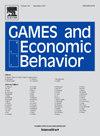Teams formation: Efficiency and approximate fairness
IF 1
3区 经济学
Q3 ECONOMICS
引用次数: 0
Abstract
A set of kn indivisible items is to be allocated to n agents; each agent has to get exactly k items, and agents have additive utilities over bundles. Can one find an efficient and approximately fair allocation? In this setting, we introduce new notions of approximate fairness, based on exchange of two single objects, and compare them to the “traditional” ones based on disregarding one object.
Our model and new fairness properties are insensitive to positive affine transformations of utilities, hence, there is no need for a separate treatment of “goods”, “bads”, and “mixed objects”. A famous Round Robin rule fares very well on all fairness accounts, but fails efficiency, while rules based on collective welfare maximization (like Nash or Leximin) cannot guarantee fairness, except on several special sub-domains (two agents, identical valuations, or binary utilities). EFx and PROPx still appear too strong. Traditional notions of approximate fairness do not allow for more positive results either.
团队组成:效率和近似公平
将一组kn个不可分割的项目分配给n个代理;每个智能体必须得到k个物品,并且智能体在捆绑包上有附加效用。能否找到一种有效且近似公平的分配方式?在这种情况下,我们引入了基于两个单一对象交换的近似公平的新概念,并将其与基于忽略一个对象的“传统”公平进行比较。我们的模型和新的公平性属性对效用的正仿射变换不敏感,因此,不需要单独处理“好”、“坏”和“混合对象”。著名的轮询规则在所有公平方面都表现得很好,但却没有效率,而基于集体福利最大化的规则(如纳什或列克明)不能保证公平,除非在几个特殊的子领域(两个代理、相同的估值或二元效用)。EFx和proprox似乎还是太强了。传统的近似公平概念也不允许出现更积极的结果。
本文章由计算机程序翻译,如有差异,请以英文原文为准。
求助全文
约1分钟内获得全文
求助全文
来源期刊

Games and Economic Behavior
ECONOMICS-
CiteScore
1.90
自引率
9.10%
发文量
148
期刊介绍:
Games and Economic Behavior facilitates cross-fertilization between theories and applications of game theoretic reasoning. It consistently attracts the best quality and most creative papers in interdisciplinary studies within the social, biological, and mathematical sciences. Most readers recognize it as the leading journal in game theory. Research Areas Include: • Game theory • Economics • Political science • Biology • Computer science • Mathematics • Psychology
 求助内容:
求助内容: 应助结果提醒方式:
应助结果提醒方式:


